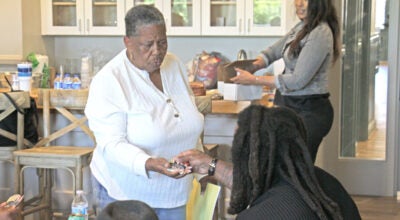Taking a lesson from the animal kingdom
Published 2:40 pm Friday, March 13, 2009
Have you ever noticed that pests seem to tense up and get completely still right before you kill them?
It’s something I just thought about seriously Wednesday night as I flicked a moth off my grocery bag.
Flies gather at the eyes and open wounds within minutes of the death of an animal.
Vultures eat carcasses and often form feasting parties around animals before they are completely dead.
But it seems a more interesting matter when animals are faced with their own mortality.
They are wired to survive by instinct, so it makes sense to me that they know when that instinct isn’t going to do them any good.
I only mention this because I’m curious what our own instincts will tell us if we allow it. The only reason I killed that poor moth is because it was coming straight for my left eye. I could have been temporarily blinded, forcing me to stumble around the room and trip on an electric cord or a stray object on the floor. Then I would have fallen and broken a limb or taken a nasty blow to my head from the corner of a piece of furniture. And then where would I have been? Lying on the floor, unconscious, bleeding and suffering from dehydration.
I’m telling you, it was him or me, and I wasn’t going out like that.
Maybe I’m taking that whole scenario a bit far, but it’s the only way I can justify killing a creature a millionth of my body weight that was going to do nothing more than leave a smudge on my counter.
So then I got thinking …
What kinds of things could we avoid if we listened to our internal voices more often? I ask this, partially drawing from a column our public safety reporter Katie Nichols wrote on Thursday. In a crisis situation, each person can likely look back on one moment when they sensed something was wrong.
The same night I had the near-death encounter with the moth, I noticed some light playing up against the window of my next-door neighbor’s window blinds. My first reaction was to shrug it off and take my groceries inside. I thought to myself he’s probably watching an action movie or having a romantic, candlelit evening with his girl.
Then something in my gut turned. I walked to the window, temporarily forgetting someone might see me and take me for a Peeping Tom.
As I got closer I heard the unmistakable sound of a smoke alarm going off. I peeked through a slit in the blinds and saw flames rising on the stove.
It turned out better than I had imagined. Short story: he fell asleep, left food on the stove, neighbor bangs annoyingly on the door.
Fortunately, fire trucks didn’t need to make a trip out to his apartment. But I’m scared to think what might have happened to both of us had I shrugged off what I saw.
According to the most recent statistics from the Department of Health and Human Services, someone dies in a fire nearly every three hours. Four out of five fire deaths in the United States occur in homes, and most people die from inhalation of smoke or toxins, not burns. Not surprisingly, cooking is the most common cause of residential fires.
I wonder how many lives and homes could have been saved had people taken action sooner or taken action at all.
So the moral of the story, children, is that even though there is one less moth among us, we can all learn a valuable lesson from his sacrifice.
The next time your muscles tense up and your stomach gets a bit queasy, stop, assess the situation and look for a reason to take action. You never know what might happen.




